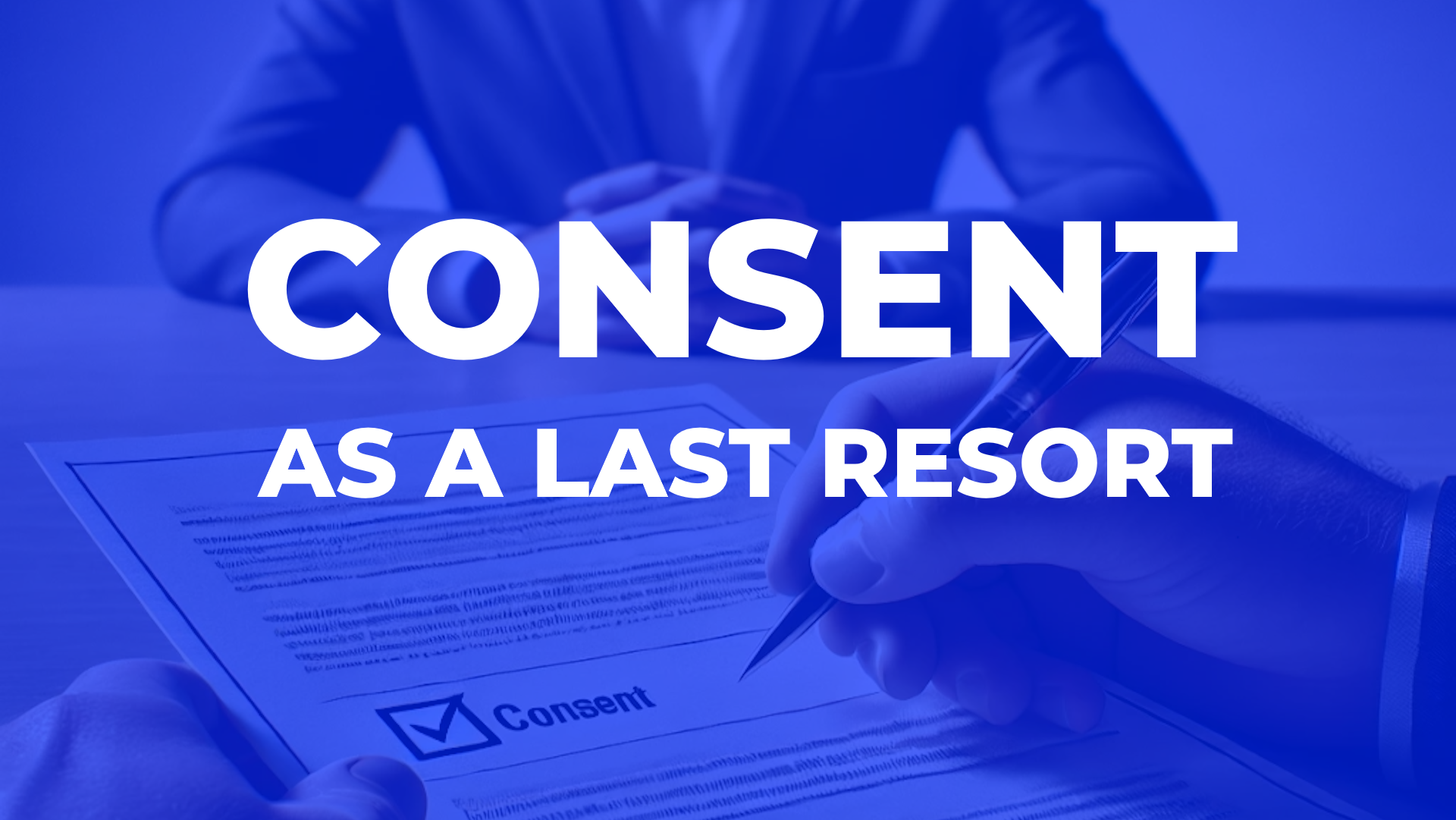Consent as a Last Resort
In the context of the General Data Protection Regulation (GDPR), it’s essential to recognize that consent is intended as a last resort rather than the primary legal basis for processing personal data. The GDPR is renowned for its comprehensive approach to data protection across the European Union and deliberately places consent lower on the hierarchy of lawful processing grounds. This approach contrasts with other jurisdictions, such as Mexico, where consent is often more prominently featured as a legal basis for data processing. Under Mexico’s Federal Law on the Protection of Personal Data Held by Private Parties (Ley Federal de Protección de Datos Personales en Posesión de los Particulares - LFPDPPP), consent is typically required for the collection and use of personal data unless an exception applies, making it a central element of their data protection regime. Understanding the specific role of consent within the GDPR is critical for achieving both compliance and fostering trust in data practices.
Understanding Consent under the GDPR
Under the GDPR, consent is explicitly defined and must meet stringent criteria to be considered valid. Specifically, Article 4(11) of the GDPR defines consent as “any freely given, specific, informed and unambiguous indication of the data subject’s wishes by which he or she, by a statement or by a clear affirmative action, signifies agreement to the processing of personal data relating to him or her.” This definition underscores the importance of consent being a genuine choice, free from any form of coercion or pressure. Moreover, the consent must be specific to the purpose of the data processing, fully informed, and given through a clear affirmative action that leaves no room for doubt or ambiguity.
To illustrate, explicit consent may involve a situation where a data subject is presented with a checkbox that they must actively tick to agree to data processing. This action must be separate from other terms and conditions, ensuring that the consent is not bundled with unrelated matters. Such clarity is vital to ensure that the data subject is fully aware of what they are consenting to, thereby fulfilling the requirement of informed and unambiguous consent.
Requirements for Valid Consent
For consent to be considered valid under the GDPR, several key requirements must be met, each rooted in the principles of data protection. Firstly, consent must be “freely given,” which implies that the data subject must have a genuine choice. If the individual feels compelled to consent, whether due to pressure, financial incentives, or fear of negative consequences, the consent may not be regarded as valid. This is particularly pertinent in contexts where there is a clear power imbalance, such as between employers and employees, where the latter may feel obliged to consent out of concern for their job security.
Additionally, consent must be “specific and informed.” This means that the consent should be clearly linked to specific purposes for data processing, and the data subject must be provided with all relevant information to make an informed decision. This includes details about the type of data being processed, the identity of the data controller, the purposes of the processing, and the rights of the data subject, including the right to withdraw consent at any time.
Finally, consent must be “unambiguous and affirmative.” This requirement is satisfied when the data subject provides a clear opt-in mechanism, such as ticking a box or providing explicit verbal or written confirmation. Silence, pre-ticked boxes, or inactivity do not constitute valid consent under the GDPR. Furthermore, the process of withdrawing consent should be as straightforward as giving it, ensuring that individuals retain control over their personal data at all times.
Challenges and Issues with Using Consent
While consent is a fundamental element of the GDPR, relying on it as a legal basis for data processing presents several challenges. One significant issue is the difficulty in obtaining genuinely informed and freely given consent in complex or imbalanced relationships. For example, in employer-employee scenarios, the inherent power dynamic may pressure employees into consenting, even when they may not fully agree or understand the implications. This raises concerns about whether such consent can truly be considered valid under the GDPR's strict criteria.
Another challenge involves the management of consent, particularly the process of withdrawing it. The GDPR requires that consent withdrawal must be as simple as giving it, yet in practice, managing withdrawals can complicate ongoing data processing operations. Organisations must have robust systems in place to promptly honour withdrawal requests, which can be technically and administratively burdensome. Additionally, this requirement can create uncertainty in long-term data processing activities, as businesses must constantly monitor and adjust to the status of individual consents.
Why Consent Was Not Intended as the Primary Legal Basis
The GDPR's approach to consent reflects a broader intention by the European legislator to avoid over-reliance on consent as the primary legal basis for data processing. Historically, consent has been seen as problematic in certain contexts, particularly where the power dynamics between the data subject and data controller are unequal, such as in employment or service provision. Instead, the GDPR emphasizes other legal bases, such as legitimate interests or contractual necessity, which may be more appropriate and reliable in these contexts.
Article 6 of the GDPR outlines several lawful bases for processing personal data, of which consent is just one option. The regulation was deliberately designed this way to ensure that organisations do not default to using consent in situations where other legal bases might be more suitable and less prone to misuse. This reflects an understanding that consent, while valuable, is not always the most practical or fair basis for processing, particularly in cases where it cannot be freely given or easily withdrawn.
Reasons to Avoid Over-reliance on Consent
There are several compelling reasons to avoid over-reliance on consent as the sole legal basis for data processing under the GDPR. One of the main issues is the complexity and risk associated with ensuring that consent meets the GDPR’s stringent requirements. If consent is not properly obtained or managed, it can lead to significant compliance risks, including legal challenges and potential fines. Moreover, overusing consent can lead to "consent fatigue," where individuals become desensitized to consent requests and start granting consent without fully understanding or considering the implications, thereby eroding the trust that the GDPR aims to build.
Additionally, in many situations, consent may not be the most appropriate legal basis for processing. For example, in cases where the data subject does not have a genuine choice—such as in essential service provision—relying on consent could be misleading and legally questionable. The GDPR provides alternative legal bases, such as legitimate interests or contractual necessity, which may offer a more balanced approach to data processing, reducing the burden on both organisations and data subjects.
Prioritising Alternatives Over Consent
Given the challenges and limitations associated with relying on consent, the GDPR encourages organisations to explore other legal bases for data processing before resorting to consent. This approach ensures that consent is used only when it is truly the most appropriate option, rather than as a default choice. For instance, when processing is necessary for the performance of a contract, such as an online retailer handling customer data to deliver goods, relying on "contractual necessity" is more straightforward and legally sound than seeking consent. In this case, obtaining consent could actually complicate the process and create unnecessary legal risks, especially if the consent is later withdrawn.
Another example involves using "legitimate interest" as a basis for processing data in scenarios where consent might seem appropriate but is not ideal. For example, a marketing firm may initially consider using consent to send promotional emails to its customers. However, if the firm has an existing business relationship with these customers, legitimate interest might be a better legal basis, provided the firm carefully assesses and documents that the customers' privacy rights are not overridden. This approach not only simplifies compliance but also avoids the risk of consent withdrawal, which could disrupt ongoing marketing efforts.
Public interest can also serve as a more suitable legal basis than consent in specific situations, such as during public health initiatives. For instance, during a public health emergency like a pandemic, authorities might need to process personal data to track the spread of the disease or distribute vaccines. Relying on consent in such cases could hinder timely and effective responses, especially if individuals choose not to consent, thereby undermining public health efforts. Instead, processing based on public interest allows for a more coordinated and legally secure approach.
Conclusion
Understanding the role of consent under the GDPR is essential, but it is equally important to recognise that consent should be considered a last resort rather than the primary legal basis for data processing. The GDPR offers a range of alternative legal grounds, such as legitimate interest, contractual necessity, and public interest, which are often more appropriate and reliable, depending on the context. By prioritising these alternatives, organisations can avoid the complexities and risks associated with obtaining and managing consent, such as the potential for consent withdrawal or the challenge of ensuring that consent is genuinely informed and freely given.
Only when no other legal bases are applicable should consent be used, and even then, it must meet the GDPR's stringent requirements to be valid. This approach not only simplifies compliance but also better aligns with the GDPR’s intent to protect individuals’ rights while accommodating the practical needs of organisations. By carefully assessing each data processing activity and selecting the most suitable legal basis, organisations can ensure that their data practices are both legally sound and respectful of the rights and expectations of data subjects.



